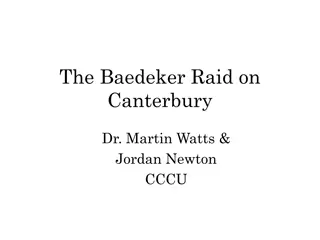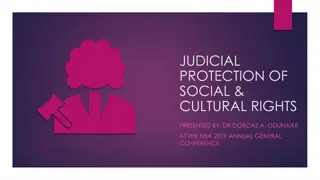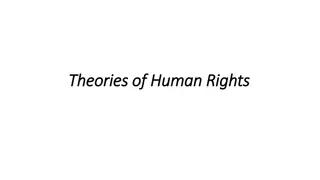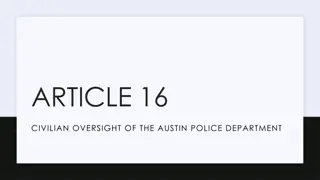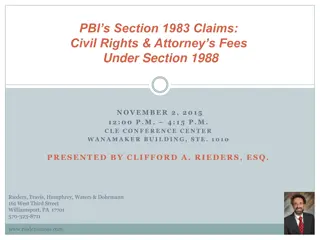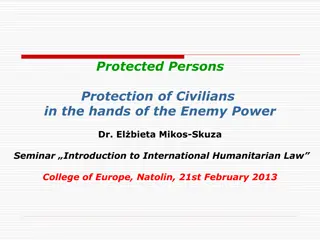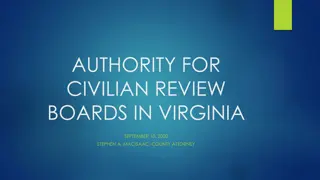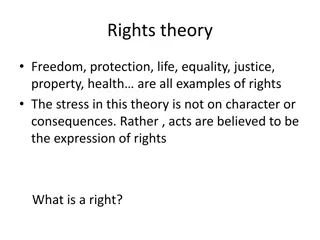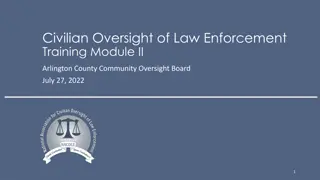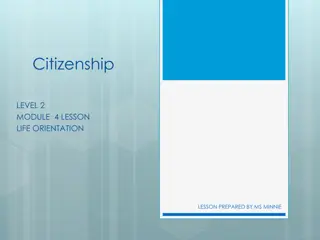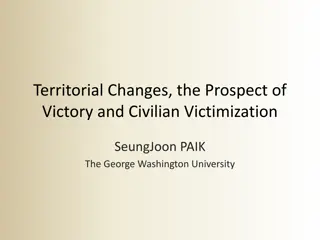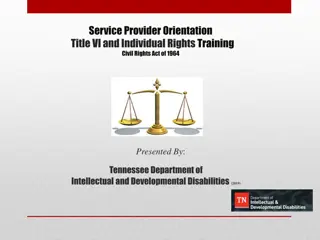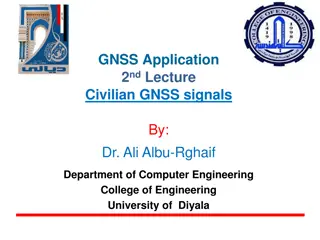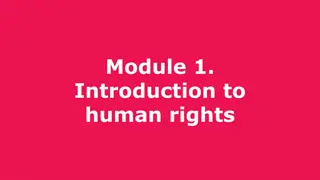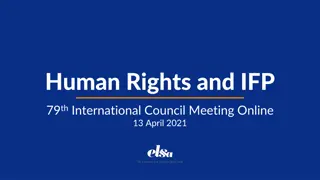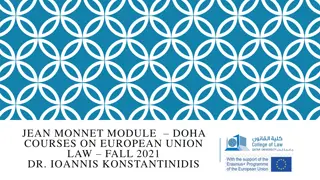Approaches to the study of Human Rights
The Marxist perspective on human rights emphasizes social rights over individual rights, viewing the full realization of self within society. Marx connects bourgeois society with human rights, highlighting how exploitation under capitalism alienates individuals. In contrast, the Third World perspect
5 views • 19 slides
Promoting Children's Rights in Education for Scotland's Learners
Raise awareness about Children's Rights, the United Nations Convention on the Rights of the Child, and how to embed them in education. Explore the importance of developing a culture that upholds rights-based practices and supports children in claiming their rights. Reflect on professional standards
1 views • 26 slides
The Impact of WWII Bombing Raids on Canterbury and Surrounding Cities
Explore the historical events of WWII bombing raids on Canterbury, Coventry, London, and other cities, focusing on the destruction caused, civilian reactions, strategic objectives, and preparatory measures taken. Witness the escalation of heavy raids, the targeting of cultural landmarks, and the shi
0 views • 25 slides
Understanding Human Rights: Overview and Evolution
Human rights encompass various aspects such as human needs, generations of rights, individual status, and the indivisibility of rights. Dr. Anna Ledzi ska-Simon discusses the translation of human needs into rights, the historical evolution of rights across generations, individual rights according to
3 views • 17 slides
Understanding Human Rights in Queensland Government Work
The Human Rights Act of 2019 in Queensland outlines protected rights such as equality, freedom of expression, and fair trial. All public service employees must adhere to these rights, ensuring decisions and actions respect human rights. This act applies to everyone in the Queensland Government, with
2 views • 13 slides
Understanding the Basic Concept of Human Rights in Modern Jurisprudence
Human rights are natural and inalienable, essential for human life, based on universal principles. The concept of human rights is both simple and complex, requiring societal development and political will for implementation. Rooted in natural law theory, human rights have evolved from natural law to
1 views • 24 slides
Test Your Knowledge: The Big Children's Rights Quiz
Test your knowledge of children's rights with "The Big Children's Rights Quiz." The quiz includes true or false questions related to the United Nations Convention on the Rights of the Child, government responsibilities, the importance of rights, and the concept of Duty Bearers. Explore these thought
0 views • 24 slides
Legal Rights and Options for Regional Center Clients in California
This document discusses the legal rights and options available for adult regional center clients in California, focusing on clarifying their rights, reviewing support systems, exploring alternatives to conservatorship, and explaining the conservatorship process. It also covers children's and adults'
1 views • 35 slides
Reflection on Human Rights and Criminals
Explore the complex question of whether criminals should have human rights, delving into the distinctions between absolute and non-absolute rights, and the impact of child labor on human rights. Consider the removal of certain rights from criminals and engage in critical thinking exercises regarding
1 views • 19 slides
Civil Rights Training Overview for SMP Participants
This civil rights training presentation covers the goals of civil rights, discrimination, protected classes, examples of discrimination, components of civil rights compliance, and the importance of equal access for all participants in the SMP program. It emphasizes equal treatment, knowledge of righ
0 views • 36 slides
Judicial Protection of Social and Cultural Rights in Nigeria: Insights from NBA 2019 Conference
Discussing the judicial protection of economic, social, and cultural rights in Nigeria, focusing on the challenges, international law dimensions, violations, and the role of the judiciary in upholding social and cultural rights. The presentation highlights the need for accountability and protection
0 views • 20 slides
The Evolution of Theories of Human Rights
The Theory of Natural Rights posits inherent rights in individuals, separate from the state, which are critical for moral development and self-realization. However, critics argue against the precedence of these rights over societal constructs. Modern interpretations by philosophers like T.H. Green e
0 views • 11 slides
Challenges and Progress in 1920s American Civil Rights Movement
The 1920s in America saw significant changes in civil rights, women's movement, and prohibition. Civil rights encompass personal freedoms guaranteed by the U.S. Constitution, including freedom of speech, voting rights, and protection from discrimination. Violations of civil rights have occurred thro
1 views • 42 slides
Enhancing Civilian Oversight of Austin Police Department
The civilian oversight of the Austin Police Department is detailed, highlighting the responsibilities of the Office of Police Oversight and the Community Police Review Commission. A renewed Article 16 proposal aims to improve transparency, accountability, and community relations. The mission of the
0 views • 17 slides
Understanding Section 1983 Claims and Civil Rights Attorney Fees
Section 1983 of the Civil Rights Act allows individuals to seek redress for violations of their constitutional rights by persons acting under state law. This provision does not create new rights but provides remedies for existing rights. The history of Section 1983 dates back to 1871 and has been in
0 views • 27 slides
Protected Persons and Civilian Victims in Armed Conflicts: Understanding International Humanitarian Law
Exploring the protection of civilians in the hands of enemy powers, this content delves into the historical context of civilian victims during past wars, the dangers faced by the civilian population in military operations, sources of law protecting civilians, the concept of civilians in internationa
0 views • 36 slides
Liberal Democracy and Citizenship: Rights, Duties, and Participation
Citizenship in liberal democracies entails equal rights, duties, liberties, and constraints, with a focus on civil and political rights. The entrenchment of these rights has been key in establishing popular sovereignty and individual autonomy. Civil rights, developed in the 18th century, centered on
2 views • 16 slides
Insight into Civilian Review Boards in Virginia
Providing an analysis of civilian review boards in Virginia, specifically addressing the absence of express authority, potential workarounds, relevant statutes, and the Dillon Rule. Despite limitations, creative interpretations and legislative fixes may offer solutions to best serve the interests of
1 views • 9 slides
Understanding USERRA: Important Facts and Protections for Employees
Explore key information about the Uniformed Services Employment and Reemployment Rights Act (USERRA), including coverage of all employers, absence of statute of limitations, personal liability provisions, possible entitlements to promotions for returning military employees, and the basic purpose and
0 views • 46 slides
Evolution of Human Rights: From Ancient Times to Modern Era
Throughout history, ideas of rights and liberty have evolved, leading to the recognition of universal human rights in the modern sense. The concept of human rights can be traced back to significant historical events such as the English Bill of Rights, the Virginia Declaration of 1776, and the French
0 views • 7 slides
Understanding Citizenship and Immigration in Modern Democracies
Citizenship, a fundamental institution of modern democracies, defines the relationship between individuals and the state through reciprocal rights and duties. However, citizenship has a dual nature, serving to both include certain individuals as citizens and exclude others. Immigrants residing withi
0 views • 21 slides
Human Rights and Citizenship Rights in Leisure, Sport, and Tourism: A Historical Perspective
This text delves into the intersection of human rights, citizenship rights, and leisure activities like sports and tourism. It explores the definitions, history, and declarations related to human rights, emphasizing the importance of allowing individuals the freedom to pursue leisure activities with
0 views • 20 slides
Understanding Residents Rights in Nursing Homes
Residents of nursing homes have additional rights beyond their rights as U.S. citizens. These rights, protected by federal law, ensure that residents are treated with dignity, have self-determination, make choices, receive information, and have access to communication and services. Exercising these
0 views • 40 slides
Overview of International Human Rights Law and Treaties
This comprehensive overview delves into the foundations of international human rights law, exploring key documents such as the Universal Declaration of Human Rights, the International Bill of Rights, and various human rights treaties addressing discrimination, women's rights, children's rights, migr
0 views • 27 slides
Understanding Rights Theory and its Significance in Society
Rights theory emphasizes the importance of fundamental rights such as freedom, protection, life, equality, justice, property, and health. It traces back to contract theories of politics and delves into the concept of natural and conventional rights, both positive and negative. The theory posits that
0 views • 5 slides
Evolution of Human Rights Protection in the EU
The journey of human rights protection in the EU, from the absence of explicit rules to the affirmation of fundamental rights by the CJEU, influenced by case law and the evolution from judicial to codified protection. National courts' concerns on ensuring consistency with constitutional values led t
0 views • 9 slides
Overview of the African Commission on Human and Peoples' Rights
The African Commission on Human and Peoples' Rights was established to promote and protect human rights across Africa. The African Charter, which entered into force in 1986, emphasizes civil and political rights, including freedom from discrimination, equality, life, personal integrity, and various
0 views • 27 slides
The Significance of Human Rights in the Modern World
Human rights are fundamental rights that belong to all individuals, are inalienable, indivisible, interconnected, and should be respected without prejudice. The Universal Declaration of Human Rights, adopted in 1948 after WWII by the United Nations, is a crucial milestone document emphasizing human
0 views • 5 slides
Civilian Oversight of Law Enforcement Training in Arlington County
Explore effective practices and characteristics of good and bad investigations in civilian oversight of law enforcement. Learn about conducting and reviewing investigations, reporting practices, and handling complaints. Delve into legal questions and issues related to criminal offenses, use of force
0 views • 32 slides
Vulnerability of Radiological Materials to Theft by Terrorist Groups in US Civilian Entities
The vulnerability of radiological materials stored at US civilian entities to theft by terrorist groups, particularly low-activity sources, remains a significant concern. Security measures primarily focus on high-activity sources, leaving lower activity sources neglected and highly susceptible to ex
0 views • 16 slides
Enhancing Transparency in Human Rights Performance Measurement
This information focuses on initiatives like the Human Rights Measurement Initiative (HRMI) that aim to provide new data for researching and advocating human rights issues globally. The HRMI project, founded in 2015, collaborates with various stakeholders and is funded by philanthropic grants. It em
0 views • 19 slides
The Bill of Rights: Summary of Constitution Amendments
The Bill of Rights comprises the first ten amendments to the United States Constitution. These amendments guarantee various fundamental rights and protections to American citizens. Amendment I protects religious freedoms, free speech, and the right to assemble. Amendment II safeguards the right to b
0 views • 11 slides
Understanding Citizenship Rights in South Africa
South Africa's Constitution guarantees various rights and freedoms to all citizens, ensuring equality, dignity, and protection. The Bill of Rights enshrines over 25 fundamental rights, emphasizing equality before the law and prohibiting unfair discrimination based on various grounds. The Constitutio
0 views • 49 slides
Analysis of Civilian Victimization in the Korean War: Territorial Changes and the Prospect of Victory
This research presentation delves into the civilian victimization during the Korean War, exploring the impact of territorial changes and the prospect of victory. It examines the research question on why participants in conventional civil wars target civilians and what factors determine the violence
0 views • 13 slides
Understanding Human and Civil Rights in DIDD Services
Protecting the rights of individuals receiving Department of Intellectual and Developmental Disabilities (DIDD) services is essential. This training covers Title VI and individual rights under the Civil Rights Act of 1964, emphasizing equality and access to programs regardless of race, color, sex, d
1 views • 31 slides
Supporting Student Veterans: The Green Zone Initiative at Chattahoochee Technical College
The Green Zone Initiative at Chattahoochee Technical College aims to create awareness and provide education about military culture, supporting student veterans in transitioning to civilian and college life. By designating safe locations and identifying knowledgeable faculty and staff, the initiative
0 views • 5 slides
Civilian GNSS Signals Overview: GPS, GLONASS, Galileo
An insightful lecture on civilian GNSS signals by Dr. Ali Albu-Rghaif covers GPS, GLONASS, and Galileo signals. The content delves into GPS signal modulation, generation, receiving, and demodulation processes, highlighting the carrier wave, navigation data, and spreading sequences. It also discusses
0 views • 20 slides
Understanding Human Rights: Module 1 Overview
This module serves as an introduction to human rights principles, instruments, and monitoring mechanisms. It covers the definition of human rights, the Universal Declaration on Human Rights, key principles, and state obligations. Human rights are universal legal guarantees that protect individuals a
0 views • 21 slides
International Focus Programme: Human Rights and Technology Advocacy
The International Focus Programme (IFP) is actively engaging in advocating human rights and technology through various initiatives and campaigns. This includes organizing online meetings, webinars, surveys, and events to raise awareness about freedom of expression online, artificial intelligence, an
0 views • 8 slides
EU Charter of Fundamental Rights and European Convention on Human Rights Overview
The course module on European Union Law in Doha focuses on the EU Charter of Fundamental Rights and its relationship with the European Convention on Human Rights. It covers topics such as the EU's accession to the Convention, external action on human rights, and the differences between the Charter a
0 views • 26 slides


